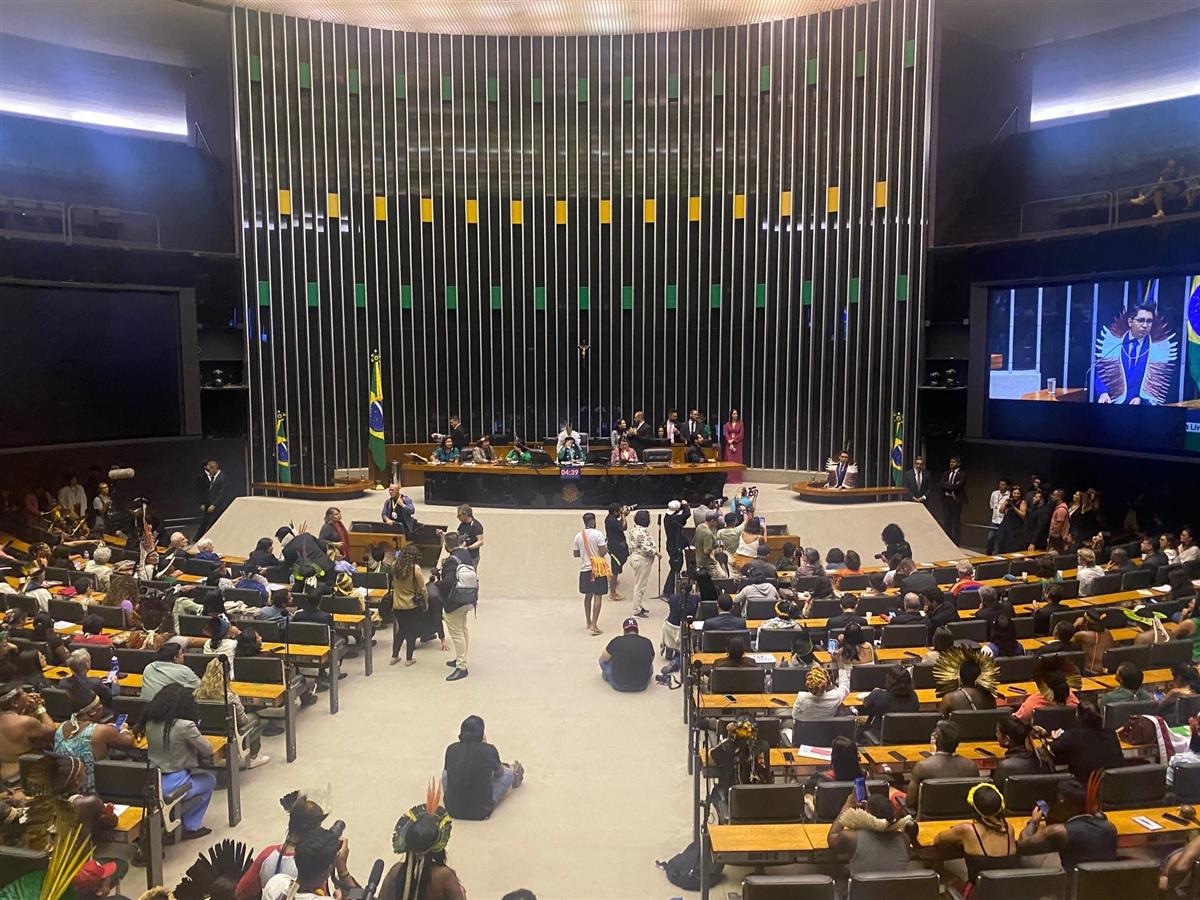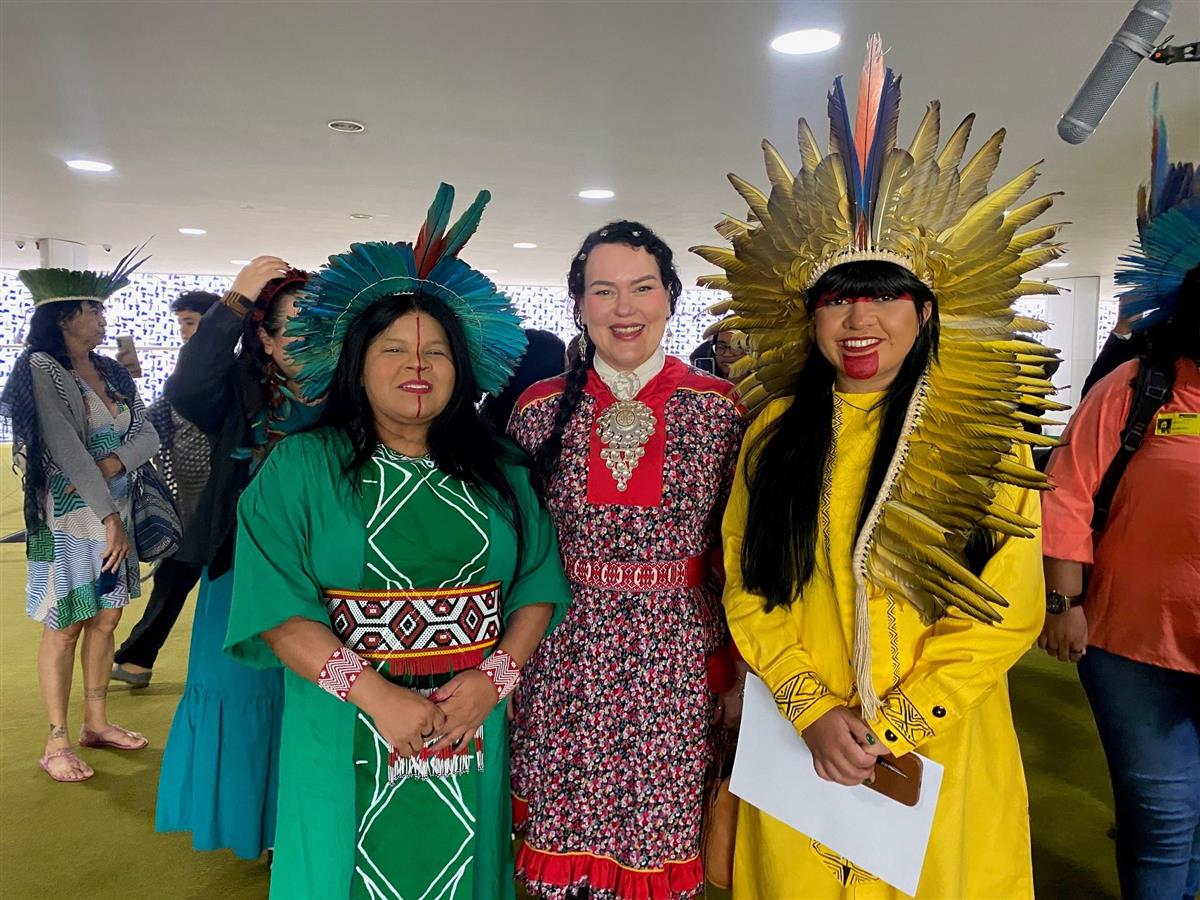
Buorit olbmot, oappát ja vieljat!
Indigenous leaders, on behalf of the sámi people, I want to acknowledge the indigenous peoples of Brazil and the indigenous peoples lands and territories.
I want to express my gratitude to federal deputy Cèlia Xakriabá for the invitation. In our culture we often will try to connect and find common ground when meeting others. Gáibmi means namesister in my language, and because of the similarities in our names, I will call the federal deputy my gáibmi.
Minister Sonia Guajajara - the indigenous world is looking in Your direction - with hope and believe in what You can ahcieve. For many of indigenous peoples they have no possibilities to make their voices heard. It means that those of us that can be heard must be heard.
Dignities and all present. We are grateful to be here. As the president of the Sámi Parliament on the Norwegian side of the Sami territories, I know that there are not many indigenous parliaments in the world. For 34 years we - the sámi people - has negotiated and formulated our own voice in the world throughout our Parliament. The parliament consists of 39 elected members and we address any chosen issue of our own choice. In accordance with the Indigenous Peoples’ right to self-determination. This is also stated in the Sami act in Norway.
I would compare the relationship with the Norwegian government as a wind of different strength, effect and intensity. The wind can soothe, it can carry seeds to the place where they can grow or it can be a storm that damages or even has the potential to ruin all. I am glad that Norway has been a wind that has brought seeds to grow for indigenous peoples in the relation between Norway and Brazil through 40 years.
International legislation and particularly the Declaration on the Rights of Indigenous Peoples and the ILO convention 169 addresses the duty to consult indigenous people and an obligation to involve indigenous peoples in decision making in matters that concern them. This is implemented both as an formal agreement between the Sámi parliament and Norwegian government and as an consultation act that legislates the duty to consult and involve sami right holders and the sami people in decision making in issues that affects us on all levels both municipalities, regional level and state level.
It is of crucial importance that indigenous peoples effectively can take part in decision making in issues that affect us. The consultations should be carried out in good faith and with an aim of reaching an agreement. This calls for trustful sharing of the content of the decisions governments consider on a very early stage. And it requires that indigenous peoples have the capacity to participate in these processes. It is also important that Sami right holders have access to consultations.
Even though we have established and formalized the duty to consult, we are still working on the implementation of the framework. I must say we have a case - the Fosen case - where the high court in Norway unanimously has ruled that article 27 in the convention on civil and political rights is breached. The case is about the establishment of one of the largest wind power plants in northern Europe is established in the gazing areas of sami reindeer herders. This violates the human rights of the Sami people, and 560 days after the verdict the human right violation is still happening since the power plant is still running.
It is my belief that the consultations is an important tool that can provide us with better results that in the Fosen case, and we have several examples of that.
Dignities: the indigenous peoples in the Arctic and in the rainforests are on the frontline of climate change. Climate change and global warming is 3-4 times more intense in the Arctic than in the rest of the planet.
The rainforests are a key player in mitigating the effects of climate change on the planet, and they are also some of the world’s most important and vulnerable ecosystems to the changing climate.
Climate change is resulting in widespread social, environmental, and economic impacts. We - the Indigenous Peoples are especially vulnerable since of the close connection between traditional livelihoods and nature.
I would like to express my gratitude and respect to our indigenous brothers and sisters in Brazil. Our knowledge and ways of life is important for the world and can represent answers and solutions on issues regarding climate crisis, preserving our biodiversity and provide management that will strengthen our mother earth and us all - her children.
I will end with a poem from the late sami poet mr Nils Aslak Valkeapää:
Can you hear the sound of life
In the roaring of the creek
In the blowing of the wind
That is all I want to say
That is all
Giitu, thank You for the attention!
 Minister of indigenous peoples Sonia Guajajara, president Silje Karine Muotka, federal deputy Cèlia Xakriabá
Minister of indigenous peoples Sonia Guajajara, president Silje Karine Muotka, federal deputy Cèlia Xakriabá